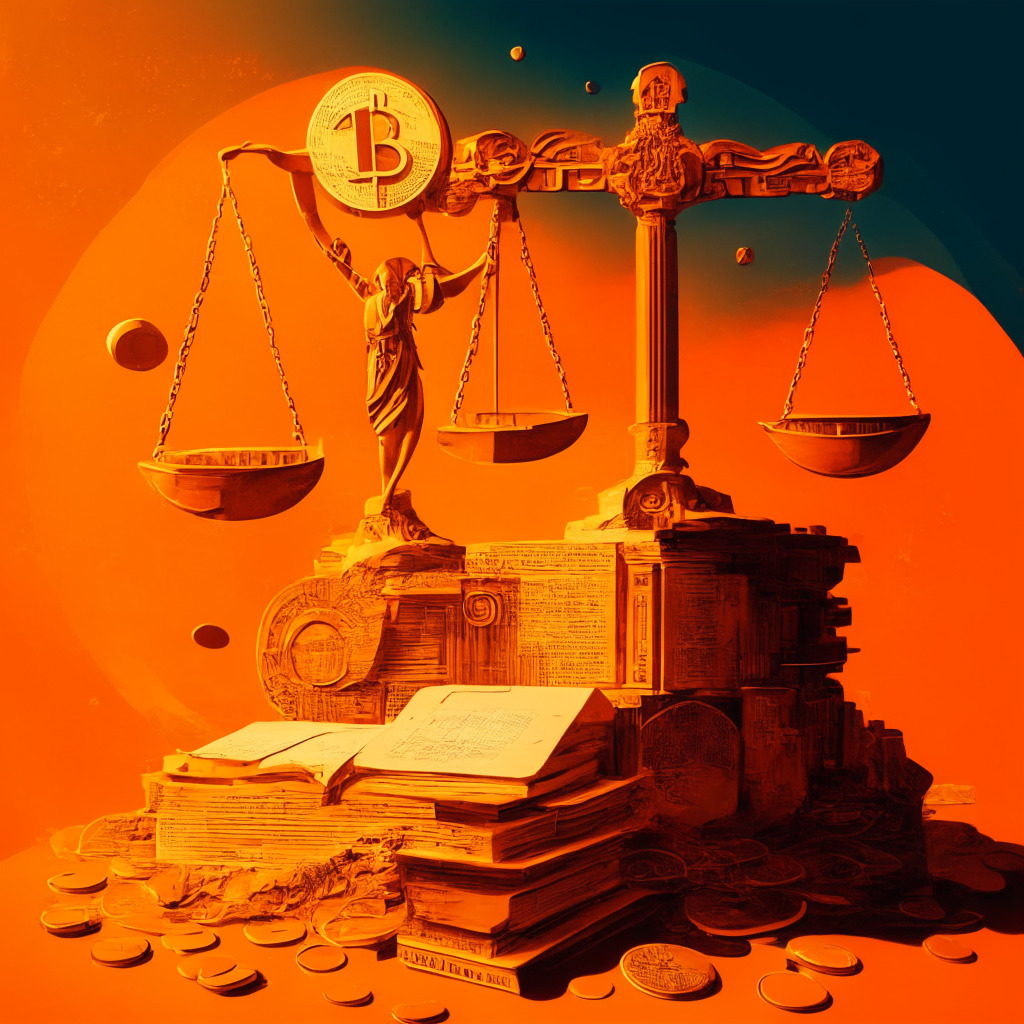“Crypto’s audacious defiance of conventional regulatory frameworks is drawing widespread regulatory attention. Enforcement activities now target leading crypto entities, leveraging laws up to 90 years old. As scrutiny increases, the key question is what will crumble first – our dated securities laws or the crypto industry itself?”
Search Results for: U.S
Inflation Surge: Decoding the Impact of Rising Housing and Energy Costs on the US Economy
The U.S. saw a 0.6% increase in its consumer price index (CPI) in August, the biggest growth in inflation in 2021, leading to a 3.7% year-over-year rise. Significant factors contributing to this include energy prices, food prices and notably, a 0.3% increase in housing costs, which makes up about a third of the CPI’s weight.
FTX Wins Court Approval to Liquidate $3.4B Crypto Assets Amid Bankruptcy: What’s Next?
“FTX, amid bankruptcy proceedings, has been authorized to liquidate its $3.4 billion cryptocurrency assets to pay creditors. The U.S. Bankruptcy Court for the District of Delaware’s decision allows FTX to sell, hedge, and stake its cryptocurrency assets. The move could shed light on the exchange’s approach to financial commitments, providing transparency into FTX’s fiscal situation.”
Navigating The Crypto Storm: BTC’s Resilience Amidst FTX Asset Sales, Inflation Growth and Market Predictions
“The BTC price remains stable above the $26,000 mark, despite the approval for FTX to sell off its cryptocurrency assets. Major digital currencies traded in sync with BTC. Meanwhile, the Consumer Price Index results showed headline inflation rising to 3.7%.”
Failing or Succeeding? Evaluating The Blockchain Association’s Influence on Crypto Legislation
The Blockchain Association, a leading crypto trade association, continues to face skepticism and regulatory hurdles despite its five-year existence. With progress impeded by the fall of FTX and reduced support from congress members, the association’s efforts to pass comprehensive crypto legislation remain unsuccessful. Notwithstanding these setbacks, it has managed some victories in mitigating impacts of proposed regulations and supporting member companies. However, the future still presents significant obstacles, and crypto lobbyists are urged to remain humble about their “achievements.”
Navigating the Regulatory Tussle: Decentralization vs Security in the Digital Asset Realm
The rapid transformation in technology and finance is due to the expanding incorporation of blockchain technology and digital assets. While this revolution brings significant advantages, it also comes with regulatory complexities. For instance, the recent verdict of the Delaware bankruptcy court granting FTX the right to sell their digital assets highlights control issues contrary to blockchain’s decentralized nature.
Navigating Bankruptcy: How Crypto Exchange FTX Plans to Leverage $3.4 Billion in Digital Assets
Judge John Dorsey has permitted FTX, a bankrupt crypto exchange, to sell and invest its $3.4 billion crypto assets to pay off creditors. FTX’s strategy involves hedging its assets to lower risk and staking digital assets for low risk returns. They also aim to leverage expert knowledge in navigating the volatile crypto market.
FTX’s Potential $3.4bn Liquidation: Boon Or Bane For The Crypto Market?
“FTX, a renowned cryptocurrency exchange, is considering liquidating up to $3.4 billion in digital assets, causing speculation about market impacts. To prevent panic selling, FTX is providing private updates to U.S. Trustees and creditor committees on planned sales.”
Regulatory Scrutiny vs Technological Advancements: Navigating the Complex Crypto Landscape
Despite regulatory challenges and hacking threats, the crypto sphere continues to innovate, with enhanced privacy, user experience, and transaction efficiency. As Ethereum plans a major transformation and Ripple maintains its legal standing, the tokenized assets market could reach $16 billion by 2030. However, effective regulation remains vital to safeguard all stakeholders.
Regulatory Maze: Stoner Cats NFT Scandal and the Lessons for the Crypto World
Stoner Cats 2 LLC (SC2), the creators of the animated series Stoner Cats, has faced charges from the U.S Securities and Exchange Commission for conducting an unregistered offering of crypto asset securities as nonfungible tokens (NFTs). The case underlines the importance of operating within legal regulations, even in the rapidly evolving world of blockchain and cryptocurrencies.
Bitcoin’s Sub-$25k Plunge: A Terrifying Dystopia or Promising Opportunity-in-Disguise?
As Bitcoin’s price dipped below $25,000, discussions ensued questioning whether this signifies a discount for investors or an impending disaster. The metric often used to predict price movements and Bitcoin’s inverse correlation with the U.S. Dollar Index showed inconsistencies, leading to speculations amidst a trend of decreasing frequency of Bitcoin transactions. Experts offer varied opinions, from hopeful future prices to cautionary advice, reflecting the unpredictable nature of Bitcoin’s price movements.
Unraveling the Complex Connection: Interest Rates and Cryptocurrency Volatility
“The U.S Treasury’s increased borrowing is causing speculation about the impact on digital asset prices. Investors may find Bitcoin appealing in a low interest rate regime, pushing up their prices. However, high conventional interest rates could have the opposite effect. Furthermore, fluctuations in interest rates can influence overall market sentiment, leading investors towards safe haven assets.”
Navigating the SEC-Bitcoin ETF Tension: Unmasking the Comprehensiveness of Crypto Diversification
“Multi-asset crypto portfolios deliver superior diversification characteristics when compared to single-token concentration. Broader scope and relative value active management opportunities across Crypto sectors can capitalize on the numerous fundamental uses of blockchain technology rather than relying solely on giant players like Bitcoin and Ether.”
Blending Traditional Finance with DeFi: MetaComp’s Bold Game-Changer in Singapore’s Financial Scene
“MetaComp, Singapore’s digital asset platform, combines traditional finance with decentralized finance, allowing customers to purchase traditional securities with stablecoins. Despite some skepticism due to crypto volatility, the firm believes that fiat-pegged cryptocurrencies will penetrate the real economy.”
The Onslaught of Real World Assets: Pros, Cons and Impact on the Existing Blockchain Landscape
“Real World Assets (RWAs) are tangible properties making their foray onto the blockchain. Most prominent assets represented are real estate, private credit, gold and treasuries. RWAs can be purchased via a marketplace, with their value fluctuations mirroring mainstream market assets. Challenges include market movements, regulations, and fragmentation, but the potential benefits are substantial.”
Inflationary Tales: Core CPI’s Impact on Bitcoin and Emerging Economic Trends
“The core CPI showed a gain of 0.3% against an expected 0.2% increase, marking a downward yearly trend to land at 4.3%. This suggests that, despite the surge in headline inflation, if the downward trend in core inflation continues, it could dispel fears of runaway inflation.”
Navigating Rough Waters: Crypto Exchanges and Market Liquidity Amidst Regulatory Pressure
“The world of cryptocurrency is experiencing significant change amidst SEC scrutiny and exchange turbulence. Key developments include the unexpected departure of Binance.US’s CEO, BitMEX’s introduction of a prediction market, and concerns around FTX’s proposed changes in crypto assets.”
Ripple Migration: A Wake-Up Call on Regulatory Clarity in the Crypto Industry
Ripple CEO Brad Garlinghouse revealed that 80% of the company’s recruitments in 2021 will be in nations with clear regulatory landscapes like Singapore, Hong Kong, U.K., and Dubai, due to the ongoing legal frost with the U.S. SEC. This underscores how uncertain regulations can impact global industry growth.
Landmark Sentencing in OneCoin Scandal Raises New Regulatory Questions for Crypto World
OneCoin’s co-founder, Karl Greenwood, received a 20-year sentence for his role in the $4 billion pyramid scheme. OneCoin, which falsely claimed to be a cryptocurrency, caused losses for over 3.5 million victims. This case underscores the urgent need for industry regulation to prevent similar crypto-related scams.
Is PayPal’s Ethereum-based Stablecoin, PYUSD, Truly 100% Asset-Backed? Examining the Claims
“PayPal’s Ethereum-based stablecoin, PYUSD, has full asset backing, primarily from U.S. Treasury reverse repurchase agreements, says Paxos. Though overcollateralization safeguards assets, it could limit profits. Some PYUSD assets are in uninsured cash deposits, reflecting typical banking risks. PYUSD’s transparent operation may soothe some investors while raising others’ skepticism.”
Resilience of Cryptocurrencies Amidst CPI Data Release and Rising Oil Prices
“Bitcoin stands strong despite predicted CPI growth due to escalating oil costs. There’s been a small rise in the CoinDesk Currency Select Index and ether remains resilient. However, this rally might be a result of short covering and liquidity crunch rather than real sentiment change. A continued momentum in Bitcoin’s value requires steady close above critical resistance levels. Meanwhile, Curve’s CRV token trends downwards.”
Telegram’s Intertwined Saga with TON: Scandal, Redemption, and a Future in Balance
“Telegram has extended support for the TON network, boosting its token price by 7%. Once abandoned amid legal issues with the U.S. Securities and Exchange Commission, the TON blockchain was redeemed by community members who formed the TON Foundation.”
FTX’s New Playbook: Balancing Market Transparency and Strategic Interests in Crypto World
“FTX, a major crypto exchange, has revised its asset sale plan in response to U.S. Trustee concerns, without committing to disclose impending transactions. This move is causing a dip in crypto prices due to fears of a large-scale asset sell-off.”
Crypto Cold War: Navigating Regulations and Market Opportunities in the United States
Ripple’s CEO, Brad Garlinghouse, asserts the U.S. is one of the worst places for starting a crypto business due to regulatory issues. Despite legal victories, regulatory clarity remains elusive, leading Ripple to consider countries with more crypto-friendly policies. This invariably poses a dilemma for crypto businesses when regulations contradict market opportunities.
CBDC Anti-Surveillance State Act: Preserving Financial Privacy in the Age of Digital Currencies
U.S. Representative Tom Emmer, with the support of 49 other Republican representatives, reintroduced the CBDC Anti-Surveillance State Act to prevent unjust financial surveillance through retail central bank digital currencies (CBDCs). Advocates contend such government-sanctioned currency must respect financial privacy, individual freedom, and market competitiveness.
Unraveling the Blockchain Drama: The W&K Info Defense vs. Craig Wright Saga Continues
A U.S. court denied a request by W&K Info Defense to impose criminal sanctions on Craig Wright for incorrectly filling a vital financial disclosure statement. While rejecting the request, they permitted some civil sanctions to proceed. Concerns were raised about incomplete disclosure of Wright’s financial details, including bitcoin holdings.
Navigating Crypto Regulations: The CBDC Anti-Surveillance State Act and the Privacy Debate
“Regulation of cryptocurrencies and the blockchain technology is a pressing topic, with concerns about privacy and government surveillance. The ‘CBDC Anti-Surveillance State Act’, reintroduced by Rep. Tom Emmer, aims to limit unelected authorities in issuing a central bank digital currency (CBDC), fearing it could be used as surveillance resources.”
Upcoming High-Stakes Trial Pits Cryptocurrency against US Justice System
The upcoming trial of former FTX CEO, Sam Bankman-Fried, interlinks the world of justice and cryptocurrencies. The case focuses on crypto investments, views on effective altruism, and potential losses. It may set a new precedent, potentially impacting the crypto community and future regulations.
Sam Bankman-Fried’s Legal Struggle: Implications for FTX and the Cryptocurrency Market
“Cryptocurrency enthusiast Sam Bankman-Fried, founder of FTX, will remain in custody until his trial, despite defense arguments. There’s speculation that pretrial incarceration could be argued as hindering a fair defense. Meanwhile, multiple blockchain firms face imminent bankruptcy hearings, illustrating the interconnected repercussions on the wider blockchain market.”
FTX’s Potential Liquidation and the Recoil it Provokes: Navigating Market Uncertainties
This excerpt gives an overview of the recent market fluctuations triggered by FTX’s potential liquidation of crypto holdings, featuring significant stakes in Bitcoin and Solana. Despite the panic, experts argue that this anticipated chaos may have been overhyped, with sales likely to be gradual and strategic.
Bitcoin’s Volatile Dance: Navigating the Bull-Bear Stalemate amidst Market Uncertainties
Bitcoin’s value oscillation continues to be captivating, currently sitting at $26,107 after testing the $25,000 support level. Despite a promising resurgence, Bitcoin is experiencing a competing struggle to gather momentum, contending with a 15% plunge since July, versus the stability of assets like S&P 500 index and gold. Future Bitcoin value trajectories likely depend on future events such as potential approvals of Bitcoin spot ETFs and the supply reduction post April 2024 halving.
Privacy and Blockchain: Debating the Role & Ramifications of Chainalysis Data Analytics
The Change.org petition “Stop Chainalysis” argues that the company’s data analysis tools are not scientifically verified, potentially violating privacy laws and rights by linking real-world identities to crypto payments. The petition warns about violations of the Bank Secrecy Act and the Fourth Amendment. It highlights the delicate balance between protecting privacy and combating illicit activities.































